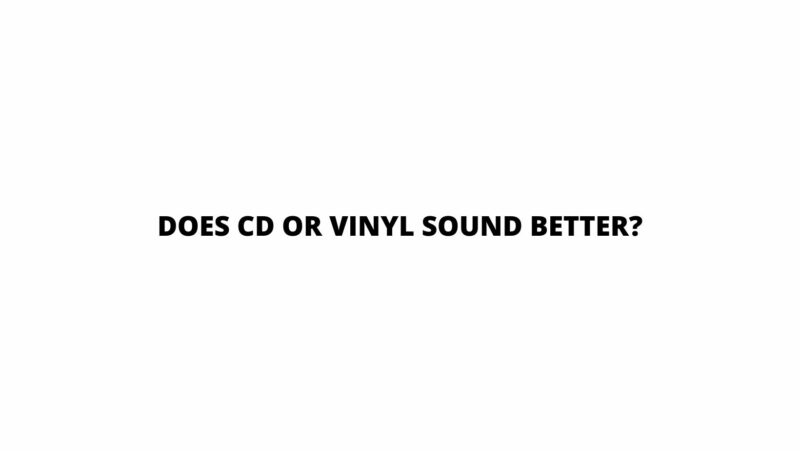The audiophile world is often a realm of passionate debates and nuanced preferences, and few topics ignite as much fervor as the comparison between CD and vinyl sound quality. In an age marked by digital convenience and tangible nostalgia, both formats have their ardent adherents who champion their unique merits. The discourse surrounding whether CD or vinyl sounds better delves into the realms of science, technology, human perception, and the intrinsic beauty of music. In this article, we embark on a comprehensive exploration of the qualities, considerations, and subjective experiences that inform the CD versus vinyl sound quality debate.
CD Sound Quality: The Digital Precision
Compact Discs (CDs) represent a pivotal moment in the evolution of audio technology. Introduced in the 1980s, CDs marked a shift from analog to digital sound reproduction. The clarity, consistency, and fidelity of CD audio are attributed to its digital nature.
- Digital Accuracy: CDs use Pulse Code Modulation (PCM) to convert analog audio signals into a binary digital format. This process involves precise sampling of the audio waveform at regular intervals, resulting in a highly accurate representation of sound.
- Resolution and Dynamic Range: CDs offer a higher resolution and wider dynamic range compared to vinyl records. The bit depth and sampling rate of CDs contribute to their ability to capture subtle details and preserve the dynamic variations in music.
- Consistency and Reproducibility: Digital audio playback is consistent across devices and systems. A CD played on different devices with the same specifications will yield the same sound, ensuring a standardized listening experience.
Vinyl Sound Quality: The Analog Warmth
Vinyl records evoke nostalgia and a tactile connection to music that is unparalleled. The analog nature of vinyl sound has a distinct character, characterized by warmth, depth, and an organic quality.
- Analog Sensation: Vinyl’s appeal lies in the continuous variation of its grooves, translating sound waves into physical imprints. This analog process captures nuances in frequency and amplitude, offering a unique sonic signature.
- Warmth and Character: Vinyl sound is often praised for its warmth and character. The natural compression inherent in vinyl playback contributes to a pleasing tonal quality that some listeners find more organic and immersive.
- Imperfections as Art: Vinyl records carry imperfections such as surface noise, pops, and crackles. While these may be perceived as flaws, they also contribute to the nostalgic and authentic nature of vinyl playback.
The Listener’s Experience: Subjective Perception
The crux of the CD versus vinyl sound quality debate lies in subjective perception. Our individual preferences, auditory sensitivities, and emotional connections influence how we perceive sound quality.
- Context and Expectation: Listener expectations play a significant role. If a listener associates vinyl with warmth and nostalgia, they may perceive the sound as more desirable, even if it’s not technically “accurate.” Similarly, if a listener is accustomed to the clarity of digital sound, vinyl playback might sound distorted or lacking in fidelity.
- Physical Engagement: Vinyl’s tactile engagement—handling records, placing the needle, and observing the spinning grooves—adds an extra layer to the listening experience. This physical interaction can enhance our perception of sound quality.
- Cognitive Bias: Cognitive bias can color our perception. The “placebo effect” might lead us to believe that a particular format sounds better simply because we expect it to. Similarly, the “confirmation bias” might lead us to hear what we want to hear based on our preconceived notions.
Comparative Factors: A Balancing Act
When assessing whether CD or vinyl sounds better, it’s crucial to consider various factors that contribute to the overall listening experience:
- Playback Equipment: The quality of the playback system, including speakers, amplifiers, and turntables or CD players, significantly impacts sound quality. A high-quality playback system can reveal the nuances of both formats.
- Music Production and Mastering: The mastering process can significantly influence how music sounds on both CD and vinyl. A well-mastered vinyl release can offer exceptional sound quality, while a poorly mastered CD can sound flat.
- Format Variability: Not all CDs or vinyl records are created equal. The quality of the recording, mastering, and pressing can vary widely, impacting the perceived sound quality.
Conclusion
The CD versus vinyl sound quality debate is a multifaceted discussion that touches on technology, psychology, and artistry. The truth lies in the understanding that both formats offer unique listening experiences, each with its strengths and qualities.
CDs excel in accuracy, consistency, and the ability to reproduce pristine sound. Vinyl, on the other hand, offers a tangible and nostalgic connection to music, with an analog warmth and character that resonates with many.
Ultimately, the answer to whether CD or vinyl sounds better depends on the individual listener. It’s a matter of personal taste, emotional connection, and the desired experience. As technology continues to evolve, both formats have found their places in the hearts of music enthusiasts, contributing to the rich tapestry of how we experience and appreciate the art of sound.


